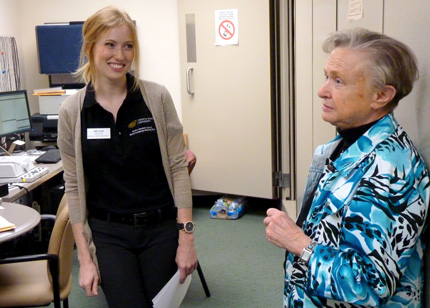Looking for a career with a 100 percent employment rate after graduation?
Wichita State University offers degrees in speech-language pathology (SLP), listed as the No. 1 best job in America by CNN Money and projected by the Bureau of Labor Statistics to grow 23 percent through 2020, faster than any other profession.
SLP is one of two professional degree programs in WSU’s Department of Communication Sciences and Disorders, along with audiology. SLP offers undergraduate courses that average 60 students per year, a two-year master’s degree program with a maximum of 25 students and a doctoral program that averages two graduates annually.
This program offers academic and clinical education at the Evelyn Hendren Cassat Speech-Language-Hearing Clinic, as well as at other school and medical facilities. Originating at Wichita State in 1934, the program is one of the oldest and most distinguished in the United States, and was the first department to award a Ph.D.
'You can recreate yourself'
Besides a bright employment outlook, speech-language pathology has a lot to offer.
“It offers portability,” said Kathy Coufal, professor and department chair. “You literally can work anywhere you want to work, in any setting, anywhere geographically. You can recreate yourself in so many ways.”
Wichita State’s SLP program stands out for several reasons:
- In the past 10 years, 100 percent of the program's graduates have gotten jobs in the field.
- Clinical staff work hand in hand with students and engage in applied learning — what is taught in the classroom is realized in the clinic.
- The program is consistently ranked at the top of nationally regarded SLP programs.
- Evidence-based research is produced in the Speech-Language-Hearing Clinic’s labs, giving WSU a reputation as a leader in Communication Sciences.
“People in our field are very passionate about their work,” Coufal said. “There’s nothing more human than communication, and when we see someone struggle with communication we’re motivated to figure out why.”
Communication disorders are complicated, involving social aspects and reflections of cognition. SLP is a hybrid discipline including elements from psychology, audiology, genetics, physiology, neurology and general development, from cradle to grave.
“Communication is the most important human capability we have,” Coufal said. “It’s such a personal thing. Treatment is very personalized as well.”
After evaluating a client, speech-language clinicians tailor holistic treatments. Speech-language pathologists work with individuals of all ages who exhibit impaired communication attributed to fluency, speech, language and swallowing disorders. This includes impairments related to aphasia, autism, neurologic conditions such as stroke and traumatic brain injury, language-literacy problems, hearing loss, and all other developmental, acquired or congenital conditions that impact communication.
Nationally regarded researcher
One asset WSU has that no other university can boast is professor Barbara Hodson.
Hodson came to Wichita State in 1989 from San Diego State University because she wanted to work with doctoral students, and was recruited to facilitate research productivity.
Besides being a favorite mentor for students, Hodson is a nationally regarded researcher and the only member of the department’s faculty to earn WSU’s Excellence in Research Award and ASHA Honors, SLP’s highest recognition. She has made more than 400 presentations around the world.
The core of her interest is a passion for helping young children, and a lot of her effort has focused on speeding up the progress of intelligibility.
“When children are not intelligible by age five, it can have a big impact on literacy,” Hodson said. “I like to work with children because I like to see results. Young children don’t know when they’re unintelligible. There’s still a lot of research to be done.”
New approaches to research are also being explored by partnering with other disciplines and departments at Wichita State, including the Department of Engineering. One joint project paired middle-school-age boys with autism and robots made of Legos. The novel approach helped the boys to work in teams, a difficult feat for children on the autism spectrum.
Another crossover project involves blending bio-engineering with communication, developing what are called Augmented and Alternative Communication (AAC) devices that provide mechanical speech or aid in functional behavior and communication.
Speech-language pathology is a demanding and rewarding program that has a lot to offer, both to Wichita State and the community.
“It’s very intense,” said Cassandra Silva, an SLP student who moved to Wichita from California for the masters degree program, “but I fell in love with it.”
“So many people who know about us, even faculty at the university, don’t realize the scope of what we do,” said Coufal. “Speech-language pathology may be the best-kept secret at Wichita State, but we want to change that, and it certainly is in demand as a profession.”
 Hodson photo |
| Barbara Hodson, right, works with an SLP student. |

